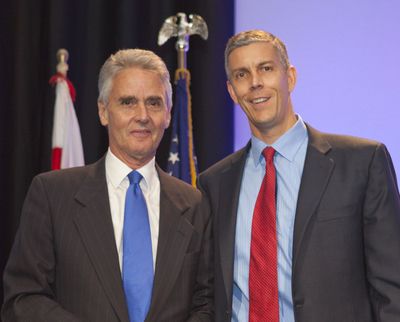Clash looms over No Child law
Projected failure by schools prompts promise of waivers by education secretary

WASHINGTON – With the clock ticking, federal education officials fear that calamity awaits.
If Congress doesn’t move quickly to change the No Child Left Behind law, they project that a whopping 82 percent of the nation’s public schools could fail to meet proficiency targets this year, facing sanctions that ultimately can include a loss of federal aid. That’s up from 37 percent last year.
Beset with a case of the jitters, Education Secretary Arne Duncan is warning of “a slow-moving educational train wreck for children, parents and teachers” – and he’s not waiting for the crash.
With Congress showing no signs of meeting a request by President Barack Obama to overhaul the law by this fall, Duncan said he’ll use executive authority to waive some requirements of the law, essentially freeing states from any harsh consequences if their schools fail to meet the federal testing requirements.
His threat has set off a clash on Capitol Hill, where key lawmakers say it would be a mistake to bypass Congress. They’re not particularly eager to relinquish their authority to the executive branch.
“If we give over to the administration complete authority to determine from the rooftops what those requirements are going to be, I think we have not done our responsibility,” said Washington state Democratic Sen. Patty Murray, a veteran member of the Senate Health, Education, Labor and Pensions Committee and one of a handful of senators assigned to try to negotiate a renewal of the law.
Democratic Sen. Tom Harkin of Iowa, the committee’s chairman, said it “seems premature at this point to take steps outside the legislative process” to try to fix the law “in a temporary and piecemeal way.”
“The best way to fix the problems in existing law is to pass a better one,” he said.
And in the House of Representatives, Minnesota Republican Rep. John Kline, the chairman of the House Education and the Workforce Committee, sent a letter to Duncan on June 23, demanding that he explain by July 1 the legal authority he has to act alone in granting waivers to states.
“He is not the nation’s superintendent,” Kline said, adding that Duncan’s demands could result in “greater regulations and confusion for schools and less transparency for parents.”
The back and forth marks the opening salvo in what’s sure to be a hot debate over how fast and how far Congress should go in watering down or scrapping the federal requirements imposed by the landmark No Child Left Behind law.
Some of the loudest calls for change have come from liberals and civil rights groups, who say the tough testing requirements, along with stronger discipline policies, are forcing too many students to drop out.
Congress voted overwhelmingly to pass the law in 2001, giving President George W. Bush one of his first major domestic achievements. After making K-12 education a centerpiece of his winning presidential campaign in 2000, Bush pressed hard for the law, wanting to put a new emphasis on high-stakes tests to identify poor-performing schools and then publicly shame them to force improvement.
Ten years later, school officials have grown weary of the uproar that accompanies the annual release of test scores. For them, the most onerous result is a listing of schools that failed to make “adequate yearly progress” toward meeting a goal that many say was impossible from the start: getting every child in America proficient in reading and writing by 2014.
When it passed, the goal seemed so distant that few objected. Now with the deadline only three years away, there’s a new mantra for many critics, including Duncan: Give schools “flexibility” to prove success in other ways.
Under the law, states are free to set their cutoff scores to determine what’s proficient in any particular year, but the hurdles keep rising as states gradually aim for 100 percent proficiency in 2014.
“It clearly shows one of the challenges of setting high expectations, which I think are important,” Murray said.
Without fast action from Congress, Duncan said, the Obama administration would begin providing “regulatory flexibility” to states, still insisting on accountability but giving them “the flexibility they need to raise standards, boost quality and improve” schools.
But with Congress set to take off the entire month of August for its yearly summer recess, many members acknowledge there’s little chance of making any big changes before a new school year begins.